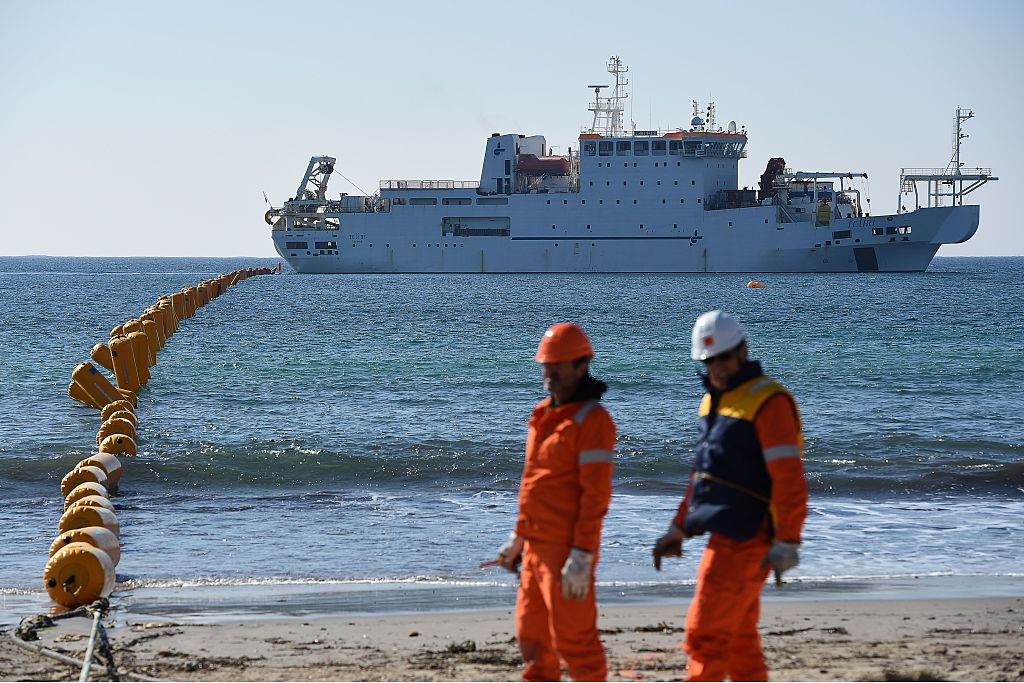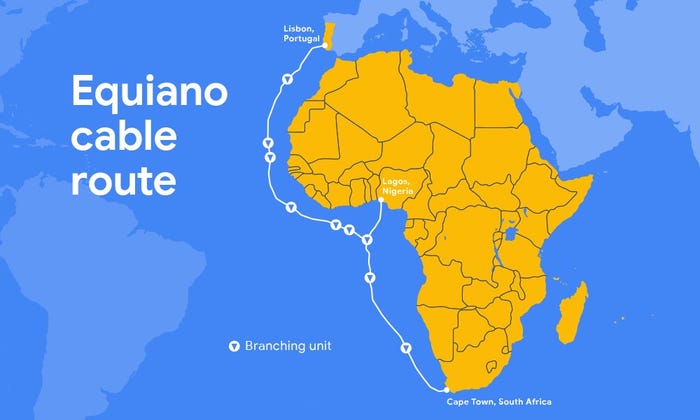Betting on Market Growth in Africa, Google Funds New Submarine Cable
Says its third wholly-owned subsea cable will have 20 times more capacity than the last one built for the region
June 28, 2019

Google is making a big bet on market growth in South Africa and potentially other countries on the African continent.
The company announced Friday that it is funding construction of its own new submarine cable that will connect Lisbon to Cape Town. Running along Africa’s west coast, the cable is designed to make it possible in the future to add branches along its length that land in other points along the coast. The first such branch has already been decided and will land in Lagos, Nigeria.
While Google, a subsidiary of Alphabet, has funded 13 submarine-cable construction projects over the years, this is only the third time the company is paying for an entire cable on its own. Most of its investments have been as part of consortia that typically get together to fund this kind of infrastructure.
The consortia have traditionally consisted of telecommunications companies and governments, but in recent years started to sometimes include tech giants that operate global cloud platforms, such as Google, Facebook, Microsoft, and Amazon. The tech companies invest in cables to ensure they not only have enough transcontinental bandwidth in their network backbones but also redundant paths to route traffic around downed connections.

equiano google submarine cable route
Google funding it alone means the Equiano system – named after the Nigerian-born writer and abolitionist Olaudah Equiano – will be built faster, according to a blog post authored by three of Google’s infrastructure team leads. It also means Google will have the cable’s bandwidth all to itself if needed. The company said the system will provide about 20 times more capacity than the last one built to serve the region.
Alcatel Submarine Networks will build the cable, whose first phase, connecting South Africa to Portugal, is expected to be finished in 2021.
According to Google, Equiano will also be the first subsea cable capable of “optical switching at the fiber-pair level” instead of “traditional wavelength-level switching.” This technology will allow Google to add and reallocate capacity in different parts of the system as needed, the company said.
Google didn’t say how much it was expecting to spend on the project, but submarine-cable builds of this scale typically cost hundreds of millions of dollars. Treating investment in its global infrastructure as a way to gain advantage over competitors, Google said it has spent $47 billion on data centers and network infrastructure just in the last three years, stepping up efforts to win public-cloud market share from Amazon Web Services, Microsoft Azure, and others.
Its cloud services already seem to enjoy widespread use in South Africa, but it has yet to build a data center there. Earlier this year Microsoft, which is also already a major cloud player in the market, became the first of international cloud giants to launch data centers in the country; Amazon Web Services expects to launch cloud facilities there next year.
Commenting on Microsoft and Amazon’s activity, Jon Tullett, a Johannesburg-based IDC analyst, told Quartz that public cloud could become a “billion-dollar market” in South Africa. He also said there was currently a “short-term acceleration in growth” in cloud and related services there and in other countries on the continent.
Illustrating just how much the market for digital services in South Africa is expected to pick up in the near future is the amount of submarine-cable building activity taking place there.
Google’s Equiano isn’t the only new submarine cable that will land in the country over the next several years, according to TeleGeography’s Submarine Cable Map. Six cables land in South Africa today, and six more are expected to come online over the next three years, not including Google’s system. Three of the cables in progress will land in Cape Town. (None currently land in the city, although two land not far up the coast.) The six new systems will expand the region’s connectivity to North America, South America, Europe, Middle East, and Asia.
Thirteen cables land in Portugal today, and one more is expected to launch in 2020, linking it to Brazil, Capo Verde, and French Guiana.
Read more about:
Google AlphabetAbout the Author(s)
You May Also Like



.jpg?width=700&auto=webp&quality=80&disable=upscale)



